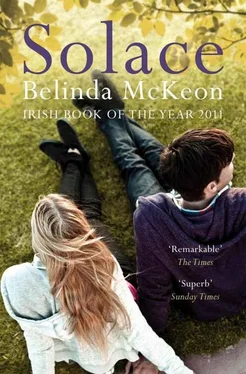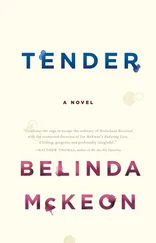In his jeans pocket, Mark felt his phone vibrate. He didn’t need to answer it. He didn’t need to check the number. It was Monday, and it was midday. He knew who it was.
She had written novels, Maria Edgeworth, and Maura had tried to read one of them, but it had had nothing she could recognize. She liked to read, but only stories she could imagine happening around her, in her own time, in her own world. Anyway, any time she asked Mark about his writer, he said he was tired of her himself by now. He said he could not wait until the thesis was finished, until he did not have to think about her any more. And yet he could never really say when he thought that would be. Neither could he ever say, for sure, when he might able to come home again for a couple of days to help Tom with the work of the farm. Usually he just turned up, and usually just at the point where Tom’s impatience seemed on the verge of darkening into real anger. He had inherited her own ability to gauge Tom’s impatience at a remove, and to know when it was no longer a good idea to delay. She never asked him to come home; she would not plead. When he had to come, he came.
He was waiting at the station when she got there, sitting on a window ledge with his bag at his feet. He had cut his hair since last she saw him; it made him look like a boy again. He would soon be thirty, her only boy, and still she was driving to the station to meet him. Other women watched out their windows as their sons arrived from Dublin in their new cars, as they came for a weekend away from the jobs that had given them their houses, their dark pressed suits, their air of being older than they were. Whether she should want those things for Mark, whether she should feel disappointed in him for not having them, she could not tell. If there was a job like that, if there was a house, then the break between his life there and his life here would be clear: Tom could no longer push it, could no longer press his wanting on the situation until it yielded to him. But such a break would mean other things, too, things she did not want to picture, and so Maura never went on long with this line of thought. Mark could drive, but the train was cheaper, and handier, and that for now was probably the best way to have it, she thought. Besides, there was the drive in to meet him, the drive back to the house with him at her side. He was crossing the street to the car now, raising a hand in reply to her wave, smiling in a way that let her know that, as much as he loved her, she was an embarrassment, waving like that. He threw his bag in the back seat. He put one arm tight around her shoulders as he kissed her on the cheek.
‘Well,’ he said, and she started the car.
He was talkative. That was what surprised her. Usually on the way home from the station he only ever talked in response to her questions, or sometimes to ask questions of his own. But now he was full of news, volunteering stories, jumping from one thing to the next. Mossy, the lad he lived with, was going to be someone’s best man in a couple of weeks, he said. The new flats in Smithfield were almost finished. In the grocery shop beside his house, he had got talking to an old woman somehow, and it had turned out she was from Ballymahon; she had known Tom’s sister Rose in the domestic college in Ardagh. And coming out of the National Library the other evening he had seen Bertie Ahern and Brian Lenihan in front of the Dáil.
Maura stopped at Keogh’s and asked him to go in for a batch loaf and a half-pound of ham. She had already been into Keogh’s herself that morning and didn’t feel like facing a second time into the bored curiosity of Annie McGurk, the girl behind the counter, into her questions about town, and whether it had been busy, and whether there had been many at the station, and how long Mark was home for this time. Annie McGurk had been in school with Nuala, which made her only thirty-one or thirty-two, but working behind that counter since her schooldays had turned her into the kind of character that was sent up, now, on television comedies. She asked too many questions, and she talked dull, mouthy circles on the same subjects all day to anyone who would listen. She would wring everything she could get out of Mark now, Maura knew. Probably he would come back to the car in a black mood, and maybe she should not have sent him in there after all, she thought; that mood was bound to come on him soon enough during his days at home. But she could not face into it herself again. She was too tired for it. She turned the car radio off and wanted nothing more than to close her eyes and get a few moments’ sleep. But if she was seen sleeping in the car it would be all over the country by evening: they would say she was drinking, on anti-depressants, dying. Breda Keogh was probably watching her right now from the upstairs window.
Instead Maura fixed her gaze on Paddy Keogh’s field beyond the petrol pumps, the field that had been wild, and scattered with wild-looking cattle, for as long as she had been about the place. Every other wild field in the area was a field of new houses now, and Keogh could make a fortune on his field if he sold it to the developers who were known to be interested in it, but Keogh would not sell. He would never believe that the price he was offered was the highest price he could get, no matter how high that price went, no matter by how much it climbed above the little that the land, in truth, was worth.
Maura had met Paddy and Breda Keogh long before there was any need to meet them. She and Tom had been going together for only five or six months at that stage, and there had been no reason, really, for him to bring Maura to see the place he had built up the road from his parents’ old house, no reason for them to see each other anywhere other than in the dancehalls and pubs and at the pictures. But one Saturday night he had announced that he wanted to know what she thought of the house, and he had arranged to collect her from the manor the next evening and take her out to see it.
Since they had been together she had wondered what the house could be like, knowing that he had done it all himself in the two years since his mother’s death; the building, the painting, the buying of the things inside. She tried to imagine it, a house furnished and decorated by a man all on his own, and she tried not to imagine what that could mean for her, what kind of place she was setting herself up for, getting closer and closer to every time she lifted her mouth to his in the front seat of his car. And so as they drove down that summer evening, the sun still high in the sky, she was as fearful as she was curious, and when he pulled the car into Keogh’s yard she had looked at him and looked out at the rough-built house in front of her, the ugly extension piled up on top of what must have been an old cottage, and she had only shaken her head and tried not to burst into tears. It was not until Tom got out of the car and went into the house that she registered it, the way the door was wide open, the way there was someone already in there, looking out at her through the uncurtained window, the way that person was standing in front of shelves of what looked like sweets and chocolate bars, and reaching back, now, to those shelves to take something down. She had laughed at herself in relief, and seconds later, she had almost jumped out of her skin at a knock on the windscreen. Paddy Keogh had had more hair then, but the gap-toothed grin was the same, and the white shirt and black trousers were dirty-looking even on a Sunday. He had gestured at her to roll down the car window, and then he had thrust in at her a hand brown with sun and lined with grime, and shaken her hand so vigorously that she had wondered if the rocking she could feel was just herself or the whole car.
Читать дальше












